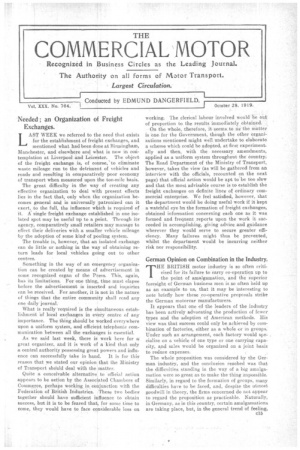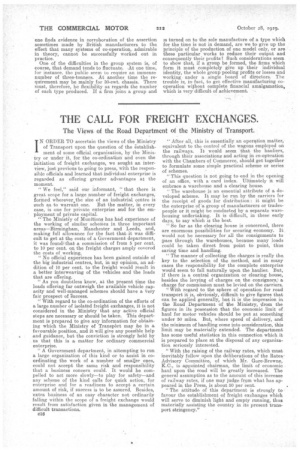'Needed; an Organization of Freight Exchanges.
Page 1

Page 2

If you've noticed an error in this article please click here to report it so we can fix it.
LAST WEEK we referred to the need that. exists for the establishment of freight exchanges, and mentioned what had been done at Birmingham, Manchester, and elsewhere and what is now in contemplation at Liverpool and Leicester. The object of the freight exchange is, of course,' to eliminate waste mileage run to the detriment of vehicles and roads and resulting in comparatively poor economy of transport when measured upon the ton-mile basis.
The great difficulty in the way of creating any effective organization to deal with present effects lies in the fact that, only -when the organization becomes general and is universally patronized can it exert, to the full, the influence which is required of it. AT single freight exchange established in one isolated spot may be useful up to a point. Through its agency, comparatively small retailers may manage to effect their deliveries with a smaller vehicle mileage by the adoption of some kind' of pooling system.
The trouble is, however, that an isolated exchange can do little or nothing in the way of obtaining return loads for local vehicles going out to other centres.
Something in the way of a,n emergency organization can be created by means of advertisement in some recognized organ of the Press. This, again, has its limitations. For one thing, time must elapse before the advertisement is inserted and inquiries can he received. For another, it is not in the nature of things that the entire community shall read any one daily journal.
What. is really -required is the simultaneous establishment `of local exchanges in every centre of any importance. The thing should be worked everywhere upon a uniform system, and efficient telephonic, communication between all the exchanges is essential.
As we said last week, there is work here for a great organizer, and it is work of a-kind that only a central authority possessing great powers and influence can successfully take in hand. It is for this reason that we stated our opinion that the Ministry of Transport eholild deal with the matter.
Quite a conceivable alternative to official action appears to be action by the Associated Chambers of Commerce, perhaps working in Conjunction with the Federation of 13ritish Industries. These two bodies together should have sufficient influence to obtain success, but-it is to be feared that, for some time to come, they would have to face considerable loss on working. The clerical labour involved would-be out of proportion to the results immediately .obtained....
On the whole, therefore, it Seems.to tie -the Matter is One_ for the Government, though the other organizations mentioned might well, undertake to elaborate a scheme which could be adoPted, at first experimentally and then, with the necessary amendments, applied as a uniform system throughout the Country: The Road Department of the Ministry of Transport, however, takes the view (as will be gathered .from an interview with the officials, recounted on the next page) that official action would be apt to be too slow and that the most advisable course is to establish the freight exchanges on definite lines of ordinary commercial enterprise. We feel satisfied, however, that the department would be doing useful work if it kept a watchful eye bri the formation of freight exchanges, obtained information concerning each one as it was formed and frequent .reports upon the work it succeeded in accomplishing, giving advice and guidance wherever they would serve to secure greater efficiency. Many failures might thus be prevented, whilst the department would be incurring neither risk nor responsibility.
germanOpinion on Combination in the Industry.. THE BRITISH motor industry is so often criticised for its failure to carry co-operation up to the point of amalgamation, and the superior foresight of German business men is so often held up as an example to us, that it may be interesting to note briefly how these co-operative proposals strike the German motorcar manufacturers.
It appears that one Of the leaders of the industry has been actively advocating the production of fewer types and the adoption of American methods. His view was that success could only be achieved by combination of factories, either as a whole or in groups: Under such an arrangement, each factory would speL cialize on a vehicle of one type or one carrying capacity, and sales would be organized on a joint basis to reduce exPenses. .
The whole proposition was considered by the German industry, and the conclusion reached was that the difficulties standing in the way of a big amalgamation were so great as to make the thing impossible. Similarly, in regard to the formation of groups, many difficulties have to be faced, and, despite the utmost goodwill in theory, the firms concerned do not appear to regard the proposition as practicable. Naturally, in Germany, as in this country, certain amalgamations arc taking place, but, in the general trend of feeling, one finds evidence in corroboration of the assertion sometimes made by British manufacturers to the effect that many systems of co-operation, admirable in theory, cannot be successfully worked out in practice.
One of the difficulties in the group system is, of course, that demand tends to fluctuate. At one time, for instance, the public seem to require an immense number of three-tonners. At another time the requirement may be mainly for 30-cwt. chassis. There must, therefore, be flexibility as regards the number of each type produced. If a firm joins a group and is turned on to the sole manufacture of a type which for.the time is not in demand, are we to give up the principle of the production of one model only, or are these particular works to reduce their output and consequently their profits? Such considerations seem to show that, if a group be formed, the firms which form it must completely give up their individual identity, the whole group pooling profits or losses and working under a single board of directors. The trouble is, in fact, to get effective manufacturing cooperation wipout complete financial amalgamation, which is very• difficult of achievement.
























